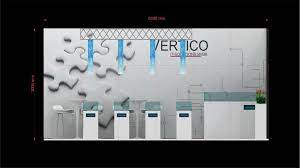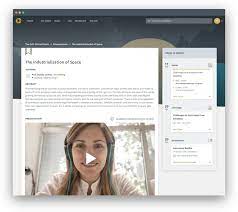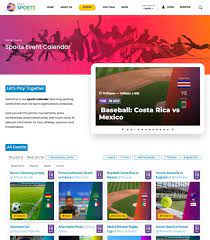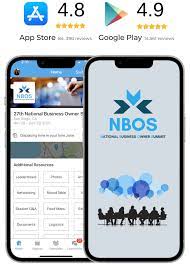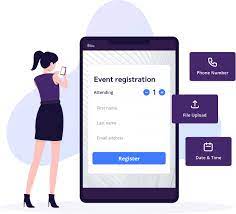Event Registration Software: Exploring the Benefits of Open Source Solutions
In today’s digital age, event organizers are constantly seeking efficient and reliable solutions to streamline their registration processes. One option that has gained significant popularity is open source event registration software. This article aims to shed light on the benefits of utilizing open source solutions for event registration, empowering organizers to make informed decisions.
Firstly, let’s clarify what open source software means in the context of event registration. Open source refers to software that is freely available for anyone to use, modify, and distribute. Unlike proprietary software, open source solutions provide a transparent and collaborative environment where developers from around the world contribute their expertise and enhance the functionality of the software.
One of the primary advantages of open source event registration software is its cost-effectiveness. Traditional proprietary systems often come with hefty licensing fees, making them less accessible for smaller organizations or events with limited budgets. Open source solutions eliminate these costs, allowing organizers to allocate their resources more efficiently towards other aspects of their events.
Flexibility is another key benefit offered by open source event registration software. With access to the underlying code, organizers can customize and adapt the software according to their specific needs. Whether it’s tweaking the user interface or integrating additional features, open source solutions provide a level of flexibility that proprietary systems may lack.
Furthermore, open source software fosters innovation through collaboration. A vibrant community of developers actively contributes to improving and expanding the functionality of these solutions. This means that bugs are identified and fixed more rapidly, new features are introduced regularly, and compatibility with other tools can be enhanced through integrations developed by community members.
Security is a critical concern when dealing with sensitive attendee data during event registrations. Open source event registration software offers an added layer of security as multiple experts scrutinize its code for vulnerabilities continuously. The transparency provided by open source solutions allows for faster identification and resolution of security issues compared to closed-source alternatives.
Another advantage of open source event registration software is the absence of vendor lock-in. With proprietary systems, organizers are often tied to a specific vendor, making it challenging to switch providers or migrate data seamlessly. Open source solutions, on the other hand, provide the freedom to choose different vendors or even self-host the software, ensuring long-term flexibility and control.
Lastly, open source event registration software encourages community support. Online forums and communities dedicated to these solutions offer a platform for organizers to seek advice, share experiences, and collaborate with like-minded individuals. This sense of community fosters knowledge sharing and empowers organizers to maximize the potential of their event registration systems.
In conclusion, open source event registration software offers numerous benefits that make it an attractive option for organizers seeking cost-effective, flexible, secure, and innovative solutions. From reduced expenses to customization options and enhanced security measures, open source solutions empower event organizers to take control of their registration processes while enjoying the advantages of a collaborative community. By embracing open source software in their events, organizers can ensure a seamless and efficient experience for both themselves and their attendees.
9 Advantages of Open Source Event Registration Software
- Cost-effective – Open source event registration software is typically free or low cost, making it a great option for those with limited budgets.
- Customizable – Open source event registration software can be customized to meet the specific needs of your organization, allowing you to create a unique experience for your attendees.
- Flexible – Open source event registration software offers a variety of features and functions that can be tailored to fit any type of event, from small gatherings to large conventions and conferences.
- Easy setup – Most open source event registration software is easy to install and configure, so you don’t have to worry about needing extensive technical knowledge or expertise in order to get up and running quickly.
- Secure data storage – Open source event registration software provides secure data storage for all participant information, ensuring that personal details remain private and secure at all times.
- User-friendly interface – Many open source solutions offer intuitive user interfaces that make it easy for organizers and attendees alike to navigate the system without difficulty or frustration.
- Automated processes – Event registration systems provide automated processes such as payment processing and ticketing which makes the process much more efficient than manual methods like paper forms or spreadsheets would be able to do on their own
- Scalability – With open source systems you are not limited by hardware resources as you can scale up when needed depending on the size of your events
- Automated reporting – You can generate reports quickly about attendance numbers, ticket sales etc which gives you valuable insights into how successful your events have been
5 Drawbacks of Open Source Event Registration Software
- Poor customer service
- Security risks
- Limited features
- Technical expertise required
- Compatibility issues
Cost-effective – Open source event registration software is typically free or low cost, making it a great option for those with limited budgets.
Cost-effective – Open source event registration software is a game-changer for event organizers with limited budgets. Unlike proprietary systems that come with hefty licensing fees, open source solutions are typically free or available at a significantly lower cost. This cost advantage allows event organizers to allocate their resources more efficiently, directing funds towards other critical aspects of their events.
By choosing open source event registration software, organizers can save substantial amounts of money without compromising on functionality or quality. The availability of free or low-cost options democratizes access to advanced registration features that were once only accessible to those with larger budgets.
Moreover, the affordability of open source solutions doesn’t mean a compromise in performance or support. Many open source projects have vibrant communities of developers who actively contribute to the software’s improvement and provide assistance through online forums and documentation. This collaborative environment ensures that organizers can still benefit from ongoing development, bug fixes, and community support without the burden of high costs.
In addition to the financial advantages, opting for cost-effective open source event registration software also promotes innovation and customization. With access to the underlying code, organizers have the freedom to tailor the software according to their specific needs. This flexibility allows them to create a personalized registration experience for their attendees while staying within their budgetary constraints.
Ultimately, the cost-effectiveness of open source event registration software empowers event organizers with limited budgets to deliver professional and streamlined registration processes without breaking the bank. By choosing these affordable solutions, they can allocate more resources towards enhancing other aspects of their events such as marketing efforts, venue selection, or guest experiences. With open source options available, organizing successful events on a budget has become more accessible than ever before.
Customizable – Open source event registration software can be customized to meet the specific needs of your organization, allowing you to create a unique experience for your attendees.
Customizable: Enhancing Event Experiences with Open Source Event Registration Software
In the world of event planning, creating a personalized and unforgettable experience for attendees is paramount. One significant advantage of open source event registration software is its high level of customizability, allowing organizers to tailor the registration process to meet the specific needs and branding of their organization.
With open source event registration software, organizers have the freedom to customize various aspects of the registration process. From designing a visually appealing and user-friendly interface to incorporating specific fields and questions in the registration form, open source solutions empower organizers to create a unique and tailored experience for their attendees.
Branding plays a crucial role in establishing an event’s identity and leaving a lasting impression on participants. Open source software allows organizers to fully customize the visual elements of their event registration platform, such as logos, colors, fonts, and overall design. This level of customization ensures that every touchpoint with attendees reflects the organization’s brand image consistently.
Furthermore, open source event registration software enables organizers to adapt the functionality of the platform according to their specific requirements. Whether it’s integrating payment gateways, third-party tools, or creating custom reports and analytics dashboards, open source solutions provide the flexibility needed to meet diverse organizational needs.
The ability to customize extends beyond just aesthetics and functionality. Organizers can also personalize communication with attendees through automated emails or notifications sent during various stages of the registration process. This personal touch helps enhance engagement and build stronger connections with participants even before the event begins.
Another advantage of customizability is the ability to accommodate different types of events. Whether it’s a conference, trade show, workshop, or fundraising gala, open source event registration software can be adapted to suit each unique event format. Organizers can create different registration paths or ticket types tailored specifically for each type of event they host.
Moreover, customizability extends beyond just the initial setup phase. As events evolve over time, organizers may need to make adjustments or add new features to their registration system. Open source solutions provide the flexibility to modify and expand the software as needed, ensuring that it remains aligned with the changing needs of the organization.
In conclusion, open source event registration software offers a high degree of customizability, enabling organizers to create a tailored and unique experience for their attendees. From branding and visual elements to functionality and communication, open source solutions empower organizations to craft a registration process that reflects their identity and meets their specific event requirements. By leveraging customizable open source software, organizers can elevate their events by providing attendees with a seamless and personalized registration experience from start to finish.
Flexible – Open source event registration software offers a variety of features and functions that can be tailored to fit any type of event, from small gatherings to large conventions and conferences.
Flexible: Open Source Event Registration Software for Every Occasion
When it comes to event registration software, flexibility is a crucial factor that can make or break the success of an event. Open source event registration software shines in this aspect, offering a wide range of features and functions that can be tailored to fit any type of event, regardless of its scale.
Whether you’re organizing a small gathering, a local conference, or a large-scale convention, open source event registration software provides the flexibility you need to customize and adapt the system according to your specific requirements. From basic registration forms to complex ticketing systems and attendee management tools, these solutions offer a wealth of options to cater to your event’s unique needs.
One of the key advantages of open source event registration software is the ability to modify the user interface. With access to the underlying code, organizers can tweak and personalize the registration process to align with their branding and event theme. This level of customization helps create a cohesive and immersive experience for attendees right from the moment they register.
Moreover, open source solutions allow for seamless integration with other tools and platforms. Whether it’s syncing attendee data with CRM systems or connecting with payment gateways for secure transactions, open source event registration software can be easily integrated into your existing tech stack. This flexibility ensures that you have all the necessary functionalities at your disposal without being limited by proprietary restrictions.
Open source software also empowers organizers with the ability to add new features or modify existing ones as per their evolving needs. Whether it’s incorporating social media sharing options, implementing personalized agendas, or integrating networking tools, open source solutions provide an extensive library of plugins and extensions that can enhance the overall functionality of your event registration system.
Furthermore, open source event registration software caters not only to organizers but also offers flexibility for attendees. These solutions often provide mobile-friendly interfaces or dedicated mobile apps that allow attendees to register on-the-go and access important event information effortlessly. This adaptability ensures that participants can engage with your event in a way that suits their preferences and convenience.
In conclusion, the flexibility offered by open source event registration software is a significant advantage for organizers. The ability to customize, integrate, and expand the functionality of the system ensures that it can cater to events of all sizes and types. With open source solutions, you have the freedom to create a tailored registration process that aligns perfectly with your event’s goals and enhances the experience for both organizers and attendees.
Easy Setup: Simplifying Event Registration with Open Source Software
When it comes to organizing events, time is of the essence. That’s why one of the significant advantages of open source event registration software is its easy setup process. Unlike complex proprietary systems that may require extensive technical knowledge or expertise, open source solutions offer a streamlined installation and configuration experience for event organizers.
Gone are the days when setting up event registration software meant hours of frustration and confusion. With open source solutions, you can quickly get up and running without the need for specialized technical skills. The simplicity of installation and configuration ensures that even those with limited technical knowledge can navigate through the process effortlessly.
The user-friendly interfaces and intuitive setup wizards provided by most open source event registration software make it easy to customize your registration forms, set up ticketing options, and configure essential features. The straightforward step-by-step instructions guide you through each stage, ensuring that you don’t miss any critical settings.
Moreover, open source solutions often come with comprehensive documentation and online resources. These resources provide detailed guides, tutorials, and troubleshooting tips to assist you throughout the setup process. In case you encounter any difficulties or have specific questions, vibrant online communities dedicated to these open source solutions are ready to offer support and guidance.
The ease of setup offered by open source event registration software not only saves time but also reduces stress for event organizers. You can focus more on planning the actual event rather than getting caught up in complicated software installations. This simplicity allows you to hit the ground running quickly and efficiently.
Additionally, easy setup means that updates or modifications can be implemented seamlessly. As your event evolves or new requirements arise, open source solutions allow you to make necessary adjustments without disrupting your existing setup. Whether it’s adding new fields to your registration form or integrating with other tools, making changes is a hassle-free process.
In conclusion, choosing open source event registration software provides an easy setup experience for organizers. The simplicity of installation and configuration eliminates the need for extensive technical knowledge, allowing you to get your event up and running quickly. With user-friendly interfaces, comprehensive documentation, and online support communities, open source solutions empower event organizers to navigate through the setup process effortlessly. By opting for open source software, you can streamline your event registration and focus on delivering a memorable experience for your attendees.
Secure data storage – Open source event registration software provides secure data storage for all participant information, ensuring that personal details remain private and secure at all times.
Secure Data Storage: The Key Advantage of Open Source Event Registration Software
When it comes to event registration, one of the most critical considerations is the security and privacy of participant information. Open source event registration software stands out for its ability to provide secure data storage, ensuring that personal details remain private and protected throughout the registration process.
In an era where data breaches and privacy concerns are on the rise, organizers must prioritize the security of attendee information. Open source event registration software offers a robust solution by implementing stringent security measures to safeguard sensitive data.
With open source solutions, developers from around the world collaborate to identify potential vulnerabilities in the software’s code. This collective effort ensures that any security loopholes are quickly identified and addressed, minimizing the risk of unauthorized access or data breaches.
Furthermore, open source software allows organizers to have full control over their data storage practices. They can choose where and how participant information is stored, whether it’s on their own servers or through trusted third-party providers. This level of control empowers organizers to implement industry-standard encryption protocols and other security measures that align with their specific needs.
The transparency inherent in open source solutions also contributes to enhanced data security. As multiple experts review and scrutinize the software’s code, any potential weaknesses or vulnerabilities are more likely to be discovered and addressed promptly. This continuous scrutiny helps ensure that personal details remain confidential and protected from potential threats.
Moreover, open source event registration software often provides features for secure user authentication and access control. Organizers can implement multi-factor authentication methods or restrict access privileges based on roles within their team. These measures add an extra layer of protection against unauthorized access to participant data.
By utilizing open source event registration software for secure data storage, organizers can build trust with their attendees. Participants want assurance that their personal information is handled responsibly and securely throughout the registration process. Open source solutions offer this peace of mind by prioritizing privacy protection as a fundamental principle.
In conclusion, secure data storage is a significant advantage of open source event registration software. The collaborative nature of open source development, coupled with the ability to customize and control data storage practices, ensures that personal details remain private and secure. By adopting open source solutions, event organizers can demonstrate their commitment to data security and provide attendees with the confidence that their information is in safe hands.
User-friendly interface – Many open source solutions offer intuitive user interfaces that make it easy for organizers and attendees alike to navigate the system without difficulty or frustration.
User-friendly Interface: Simplifying Event Registration with Open Source Solutions
When it comes to event registration, a user-friendly interface can make all the difference in creating a smooth and hassle-free experience for organizers and attendees alike. Open source event registration software excels in this regard, offering intuitive user interfaces that simplify the process and eliminate frustration.
One of the primary benefits of open source solutions is their focus on usability. Developers understand the importance of creating software that is easy to navigate and requires minimal training. As a result, many open source event registration systems feature clean and intuitive interfaces designed with the end-user in mind.
For organizers, this means being able to set up events quickly and efficiently. The user-friendly interface guides them through each step of the registration process, allowing them to easily input event details, customize forms, set ticket prices, and manage attendee information. With clear instructions and logical workflows, organizers can save time and effort while ensuring accurate data collection.
Attendees also benefit from open source event registration software’s user-friendly interface. Registering for an event should be a straightforward process that doesn’t require extensive technical knowledge or cause confusion. Open source solutions often provide simple forms with clear instructions, making it easy for attendees to enter their information, select ticket types, and complete their registrations seamlessly.
Moreover, an intuitive interface reduces the need for customer support or assistance during the registration process. Attendees can navigate through the system independently without encountering unnecessary obstacles or complexities. This not only enhances their overall experience but also helps organizers save time by reducing inquiries related to system usage.
In addition to ease of use, open source event registration software often offers customizable options for branding and design. Organizers can personalize the look and feel of their registration pages to align with their event’s theme or corporate identity. This level of customization adds another layer of professionalism while providing a cohesive experience for attendees.
The availability of documentation and online resources further supports users in navigating open source event registration software. Many open source communities provide detailed guides, video tutorials, and forums where users can find answers to their questions or seek advice from fellow organizers. This collaborative environment ensures that users can make the most of the software’s user-friendly interface and discover additional features that enhance their event management capabilities.
In conclusion, the user-friendly interface is a significant advantage of open source event registration software. By prioritizing ease of use and offering intuitive interfaces, these solutions empower both organizers and attendees to navigate the registration process effortlessly. With minimal training required, organizers can swiftly set up events, while attendees can register without frustration or confusion. Open source event registration software provides a seamless experience that simplifies event management for all parties involved.
Automated Processes: Streamlining Event Registration with Open Source Software
When it comes to event registration, efficiency is key. Open source event registration software offers a significant advantage in this area with its ability to automate processes, providing organizers with a streamlined and efficient experience.
One of the primary benefits of open source event registration software is the automation of crucial processes such as payment processing and ticketing. Gone are the days of manually handling paper forms or navigating complex spreadsheets. With open source solutions, organizers can leverage automated systems that simplify and expedite these tasks.
Payment processing is an essential aspect of event registration, and open source software makes it seamless. By integrating secure payment gateways, attendees can conveniently make payments online using various methods such as credit cards or digital wallets. This eliminates the need for manual payment collection, reduces human error, and ensures a smoother transaction process for both organizers and attendees.
Ticketing is another area where open source event registration software shines. With automated ticketing systems, organizers can generate and distribute tickets electronically. Attendees receive their tickets via email or mobile apps, eliminating the need for physical tickets or manual distribution efforts. This not only saves time but also reduces costs associated with printing and shipping.
Moreover, open source solutions often offer additional features that enhance the overall registration process. For instance, they may include options for creating personalized attendee profiles or managing waitlists automatically. These features further streamline the registration process by reducing administrative tasks and providing attendees with a more personalized experience.
The automation provided by open source event registration software brings numerous benefits to both organizers and attendees alike. Organizers save valuable time by eliminating manual data entry tasks and reducing administrative burdens. Attendees enjoy a hassle-free experience with convenient online payments and instant access to electronic tickets.
Additionally, automation minimizes human errors that may occur during manual processes. By leveraging open source solutions’ automated systems, organizers can ensure accurate data collection, precise financial records, and seamless ticket distribution. This not only improves the efficiency of the registration process but also enhances the overall professionalism and reliability of the event.
In conclusion, open source event registration software offers a significant advantage with its ability to automate processes. By integrating automated payment processing and ticketing systems, organizers can streamline their registration processes, save time, reduce costs, and provide attendees with a seamless experience. With open source solutions, event organizers can embrace automation to enhance efficiency and deliver exceptional events that leave a lasting impression on attendees.
Scalability – With open source systems you are not limited by hardware resources as you can scale up when needed depending on the size of your events
Scalability: Unlocking the Full Potential of Open Source Event Registration Software
When it comes to event registration software, scalability is a crucial factor that can make or break the success of an event. Open source solutions offer a significant advantage in this regard, providing organizers with the ability to scale up their systems effortlessly based on the size and requirements of their events.
One of the primary benefits of open source event registration software is that it liberates organizers from being limited by hardware resources. With proprietary systems, there may be constraints on the number of registrations, attendees, or transactions that can be handled simultaneously due to hardware limitations or licensing restrictions. This can pose significant challenges for events with growing attendance numbers or those requiring high transaction volumes.
Open source solutions eliminate these limitations by allowing organizers to scale up their systems as needed. Whether you’re expecting a surge in registrations for a large conference or planning multiple simultaneous events, open source software empowers you to accommodate increasing demands without compromising performance.
By leveraging open source event registration software, organizers have the flexibility to deploy their systems on robust servers or cloud-based platforms that can handle higher traffic and transaction volumes. This scalability ensures smooth and uninterrupted registration processes, preventing any bottlenecks that could negatively impact attendee experience.
Furthermore, open source solutions often benefit from active development communities continuously improving performance and optimizing resource utilization. These communities contribute valuable insights and enhancements that further enhance scalability capabilities. With regular updates and refinements, organizers can rest assured knowing their event registration system will continue to meet their needs as their events grow in size and complexity.
Scalability is not only about accommodating larger events; it also allows organizers to downscale when necessary. For smaller-scale events or during quieter periods, open source software enables efficient resource allocation without wasting unnecessary computing power or storage capacity. This flexibility ensures cost-effectiveness by aligning resources with actual needs while maintaining optimal system performance.
In conclusion, scalability stands as a prominent advantage of open source event registration software. By removing hardware limitations and providing the ability to scale up or down based on event size and demands, organizers can ensure seamless registration processes, even for events with significant growth or varying attendance numbers. Embracing open source solutions empowers organizers to unlock the full potential of their event registration systems, creating a scalable infrastructure that adapts effortlessly to the evolving needs of their events.
Automated reporting – You can generate reports quickly about attendance numbers, ticket sales etc which gives you valuable insights into how successful your events have been
Event Registration Software Open Source: Unlocking the Power of Automated Reporting
One of the significant advantages of utilizing open source event registration software is the ability to generate automated reports. These reports provide valuable insights into various aspects of your events, such as attendance numbers, ticket sales, and other key metrics. This article explores how automated reporting can empower event organizers to assess the success of their events more effectively.
Traditionally, generating event reports involved manual data collection and analysis, consuming valuable time and resources. With open source event registration software, this process becomes streamlined and efficient. By leveraging automated reporting features, organizers can quickly access comprehensive reports that offer a holistic view of their events’ performance.
Attendance numbers are a crucial metric for any event organizer. Open source event registration software simplifies the process of tracking attendance by automatically recording attendee data during the registration process. This data can then be compiled into detailed reports that provide a clear picture of how many people attended your event. These attendance reports enable organizers to evaluate the popularity and reach of their events accurately.
Ticket sales are another vital aspect that can be effectively monitored through automated reporting. Open source event registration software allows organizers to track ticket sales in real-time, providing up-to-date information on revenue generated from ticket purchases. By analyzing ticket sales reports, organizers can identify trends, assess pricing strategies, and make informed decisions for future events.
In addition to attendance numbers and ticket sales, open source event registration software offers a wide range of reporting options tailored to meet specific needs. Organizers can generate reports on participant demographics, feedback surveys, session attendance rates, and much more. These insights help gauge attendee satisfaction levels, identify areas for improvement, and refine future event planning strategies.
The speed at which automated reports can be generated is another advantage offered by open source solutions. With just a few clicks, organizers can access comprehensive reports within seconds or minutes rather than spending hours manually compiling data from multiple sources. This time-saving aspect allows organizers to focus on other critical aspects of event management, such as marketing, logistics, and attendee engagement.
Moreover, the availability of real-time reporting ensures that organizers have access to the most up-to-date data at any given time. This enables them to make informed decisions promptly and adapt their strategies based on current trends or emerging patterns.
In conclusion, automated reporting is a powerful pro of open source event registration software. The ability to generate reports quickly and effortlessly provides event organizers with valuable insights into the success of their events. From attendance numbers and ticket sales to participant demographics and feedback surveys, these reports offer a comprehensive overview that helps organizers assess their events’ performance objectively. By leveraging the benefits of automated reporting in open source solutions, event organizers can make data-driven decisions, improve future events, and ultimately deliver exceptional experiences for attendees.
Poor customer service
Exploring the Cons of Open Source Event Registration Software: Poor Customer Service
While open source event registration software offers numerous advantages, it is essential to consider potential drawbacks as well. One significant concern that organizers may encounter when using open source solutions is the lack of robust customer service and support typically provided by paid providers.
Unlike proprietary software, where users can rely on dedicated customer support teams for assistance, open source solutions often rely on community-driven support. While online forums and communities can be valuable resources for troubleshooting and sharing knowledge, they may not always provide the immediate and personalized assistance that some organizers require.
When using open source event registration software, you might find yourself facing challenges or encountering technical issues that require expert guidance. In such cases, the absence of a dedicated customer service team can be frustrating. While community members may offer help, response times and expertise levels can vary significantly.
Paid providers usually offer comprehensive customer support services, including direct access to trained professionals who can address specific issues promptly. This level of support ensures peace of mind for event organizers who need immediate assistance during critical moments leading up to their events.
However, it’s important to note that the lack of traditional customer service in open source software does not mean there is no help available at all. Many open source projects have active communities where users share their experiences and provide assistance to one another. Additionally, some organizations or developers offer paid support services for specific open source solutions if more dedicated assistance is required.
To mitigate the potential challenge posed by poor customer service in open source event registration software, organizers can take several steps. First, thorough research into the specific solution’s community and online resources is essential before implementation. Understanding the level of community engagement and availability of documentation can help gauge the kind of support available.
Additionally, seeking out forums or discussion boards related to the chosen open source solution allows organizers to connect with experienced users who may be able to provide guidance or troubleshoot issues together.
Ultimately, organizers must weigh the benefits of open source software against the potential limitations in customer service. While open source solutions may lack the immediate and personalized support of paid providers, they often make up for it with cost savings, flexibility, and a vibrant community of users. By considering their specific needs and available resources, organizers can make an informed decision on whether open source event registration software is the right choice for their events.
Security risks
Security Risks: Considering the Vulnerabilities of Open Source Event Registration Software
While open source event registration software offers numerous benefits, it’s important to acknowledge one potential drawback: security risks. As with any software, open source solutions can be vulnerable to security breaches and hacking attempts, making them a potentially risky choice when handling sensitive data such as credit card numbers or personal information.
The nature of open source software means that its code is accessible to anyone. While this transparency fosters collaboration and innovation, it also means that potential vulnerabilities are exposed to a wider audience, including malicious actors. Without proper security measures in place, these vulnerabilities can be exploited, leading to unauthorized access or data breaches.
However, it’s crucial to note that the risk of security breaches is not exclusive to open source software. Proprietary systems also face similar challenges and can fall victim to cyberattacks if not properly maintained or secured. The key lies in implementing robust security practices and regularly updating the software with the latest patches and fixes.
To mitigate the security risks associated with open source event registration software, organizers should adopt best practices such as:
- Regular updates: Stay up-to-date with the latest releases and patches provided by the open source community. These updates often include crucial security fixes that address known vulnerabilities.
- Secure hosting: Ensure that the server hosting the event registration system is properly configured and follows industry-standard security protocols. Implementing firewalls, encryption, and access controls can help protect sensitive data from unauthorized access.
- Third-party integrations: Be cautious when integrating third-party plugins or extensions into your event registration system. Conduct thorough research on their reliability and security track record before incorporating them into your setup.
- Strong passwords: Enforce strict password policies for both administrators and users accessing the registration system. Encourage the use of complex passwords and enable multi-factor authentication for an added layer of protection.
- Regular backups: Implement regular data backups to ensure that, in the event of a security breach, you can restore your registration data and minimize potential losses.
By following these security practices, event organizers can significantly reduce the risks associated with open source event registration software. It’s essential to stay vigilant, keep up with the latest security trends, and actively participate in the open source community to benefit from their collective knowledge and expertise in maintaining secure systems.
While security risks should be taken into consideration when choosing open source event registration software, it’s important to remember that with proper precautions and proactive measures, these risks can be effectively mitigated. By prioritizing security and implementing robust protective measures, organizers can confidently leverage the advantages of open source solutions while safeguarding sensitive attendee data.
Limited features
Limited features: A Consideration for Open Source Event Registration Software
When exploring event registration software options, it’s important to consider the potential drawbacks alongside the benefits. One con associated with open source event registration software is the possibility of limited features compared to their paid counterparts. While open source solutions offer cost-effectiveness and flexibility, it’s essential to evaluate whether the available features align with your specific event requirements.
Paid event registration software often comes with a range of advanced features and functionalities designed to enhance the attendee experience. These can include options for customized branding, personalized communication, integrated payment gateways, analytics tools, and more. In some cases, open source alternatives may not offer the same breadth or depth of features.
The limited feature set in open source event registration software can restrict your ability to tailor and customize the registration process according to your unique needs. For instance, you may want to create a highly personalized registration form with conditional logic or integrate with specific third-party tools that enhance your event management capabilities. If these features are not readily available in the open source solution you choose, it may require additional development efforts or workarounds.
However, it’s important to note that while some open source solutions may have limitations in certain areas, others might offer a robust feature set that meets most event organizers’ requirements. It’s crucial to thoroughly research and evaluate different open source options before making a decision.
Moreover, even if an open source solution lacks certain features out-of-the-box, its flexible nature allows for customization and community contributions. Skilled developers can extend the functionality of an open source system through custom development or by leveraging plugins and extensions contributed by the community. This collaborative aspect of open source software empowers organizers to bridge any feature gaps and create tailored solutions that meet their specific needs.
In summary, while limited features can be a con associated with some open source event registration software packages compared to their paid counterparts, it’s important to consider this aspect alongside the benefits they offer. Assess your event requirements and evaluate the available features of open source solutions to determine if they align with your needs. Additionally, explore the potential for customization and community contributions to address any feature gaps that may exist. By conducting thorough research and considering all factors, you can make an informed decision that best suits your event registration needs.
Technical expertise required
Technical Expertise Required: A Consideration for Open Source Event Registration Software
While open source event registration software offers numerous benefits, it’s important to consider one potential drawback: the requirement of technical expertise. Setting up and managing open source solutions often demands a certain level of technical knowledge and skill that may pose challenges for individuals who are not particularly tech-savvy.
Unlike proprietary event registration software that typically comes with user-friendly interfaces and intuitive setups, open source solutions often require a deeper understanding of software installation, configuration, and maintenance processes. This can be intimidating for those without prior experience or a background in technology.
For non-technical users, the learning curve associated with open source event registration software may be steep. The setup process might involve tasks such as server configuration, database management, and code customization. Without the necessary technical expertise, individuals may struggle to navigate these complexities effectively.
Moreover, ongoing maintenance and troubleshooting can also be daunting for those lacking technical skills. While open source communities often provide support through forums and documentation, resolving issues may require a certain level of proficiency in programming languages or system administration.
However, it’s worth noting that this con can be mitigated by seeking assistance from experts or dedicating time to learn the necessary skills. Online resources such as tutorials and guides can help bridge the knowledge gap for individuals who are determined to utilize open source event registration software but lack technical expertise.
Additionally, some open source solutions offer user-friendly interfaces or simplified installation packages specifically designed to cater to non-technical users. These options aim to make the setup process more accessible and manageable for a wider range of individuals.
Ultimately, while technical expertise is indeed a consideration when opting for open source event registration software, it should not discourage potential users entirely. With the right resources and support available, even those without extensive technical backgrounds can overcome this challenge and harness the benefits of open source solutions.
By being aware of this con upfront, organizers can make informed decisions about whether to invest in open source event registration software, considering their own technical capabilities or the availability of external assistance. With proper planning and support, the potential benefits of open source solutions can outweigh the requirement for technical expertise, enabling organizers to create seamless and efficient registration experiences for their events.
Compatibility issues
Compatibility Issues: A Consideration for Open Source Event Registration Software
While open source event registration software offers numerous advantages, it’s important to consider potential drawbacks as well. One such concern is the possibility of compatibility issues when integrating with existing systems at your organization or venue. Understanding and addressing these challenges is crucial to ensure a smooth setup and implementation process.
Compatibility issues may arise due to differences in technology, data formats, or protocols between the open source software and other systems within your infrastructure. For example, if your organization already utilizes a specific customer relationship management (CRM) system or an email marketing platform, it’s essential to verify whether the open source event registration software can seamlessly integrate with these tools.
In some cases, compatibility issues can result in data inconsistencies or difficulties transferring information between systems. This can lead to manual workarounds or even data loss if not properly managed. It’s essential to thoroughly assess the compatibility requirements of the open source solution before committing to its implementation.
To mitigate these concerns, it is advisable to conduct thorough testing and engage with experienced developers or technical experts who can provide guidance on compatibility matters. They can help identify potential conflicts and devise appropriate solutions or workarounds.
Additionally, keeping communication channels open with the community surrounding the open source event registration software is valuable. Engaging in discussions with other users who have faced similar compatibility challenges can provide insights into potential solutions or alternative approaches that have been successful in overcoming such issues.
It’s also worth noting that some open source solutions offer plugins or extensions specifically designed for integration with popular platforms. These plugins can simplify the process by providing pre-built connectors that bridge any compatibility gaps.
In conclusion, while compatibility issues may pose a challenge when implementing open source event registration software, they are not insurmountable. By conducting thorough research, testing, and seeking assistance from professionals experienced in integrating different systems, organizers can minimize potential problems during setup and ensure a successful implementation.
Ultimately, the benefits of open source event registration software, such as cost-effectiveness, flexibility, and community support, often outweigh the challenges. By proactively addressing compatibility concerns, organizers can leverage the advantages of open source solutions while ensuring seamless integration with existing systems in their organization or venue.


